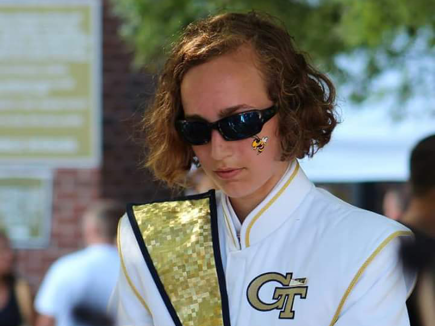Erin Seligsohn
Caterpillar Inc.
Peoria, Illinois
Department: Virtual Product Development
Education: B.S. Mechanical Engineering, 2014, and M.S. Mechanical Engineering, 2016, Georgia Institute of Technology
Career stage: Early—3 years post Bachelor’s

What She Does
In her “home” group (where she started and where she will return upon finishing her rotations), Erin helps develop new tools and methods to expand Caterpillar’s simulation capabilities in regards to engine mechanics. Caterpillar has many internal simulation tools that are critical to their design processes. Currently, she is rotating in a group that does core engine component simulation, which means that they use a number of simulation tools—including the ones that her home group develops—along with finite element analysis to predict engine performance and durability before prototyping and testing. It is much easier to fix problems if you catch them before you ever start building anything in iron.
Necessary Job Skills
Erin’s whole job is mathematical modeling. Her group creates a variety of different models of engines and components to predict their behavior before prototyping and production. Some models are “one-dimensional” in that you simply input a number of engine parameters and get an output of various performance metrics. Other models are “three-dimensional” such as those where you divide a modeled geometry into tiny pieces called finite elements and model how they respond when forces or thermal loads are applied. These models are physics-based, meaning that they rely on what is known about the physical properties of materials and their responses to various load conditions.
Pros and Cons Of Her Job
It is really cool how you can take a very complex situation - something that you could never solve with hand calculations—and create a model to predict the behavior.
Work/Life Balance
Erin works at a job she really enjoys and still has plenty of time after work and on weekends to enjoy hobbies. The rotational program she is in promotes social activities (skiing, trivia, art crawls, etc.) so she gets to know the other young engineers in the company.
Career Path
Erin’s career is just beginning. She knew she wanted to be an engineer because she liked using math to solve problems. She took a survey class in college that introduced her to all kinds of engineering. That helped her choose mechanical engineering, and to help narrow down her options within ME, she interned for a few different companies while in school, taking on different roles in different industries. Her last internship, with Caterpillar, resulted in an offer to join the Engineering Rotational Development Program, working in three or four different groups within Caterpillar over a year or two.
It surprised me a little to see how much is left to learn. I thought “well, I’ve got two degrees now, so I’m ready to be an engineer. Sure, I’ll learn some application-specific things, but I mostly know what’s going on.” It’s nice that now I can immediately apply what I’m learning to real problems and see the results.
Career Expectations and Advice
If you’re a student, do internships, get involved in research, join a club where you get to design and build things. Internships provide a variety of experiences and help you figure out what sort of work you like to do. If you’re already in the workforce, take every opportunity to learn or try something new. The options aren’t quite as plentiful as they are in school, so you need to make a little extra effort to find them, but they are still very much worth it.
Take every opportunity to learn or try something new.
Salary
A starting mechanical engineer with a Bachelor’s degree can expect to earn in the $60,000 to $80,000 range. A Master’s degree raises that up by about $10,000, and a Ph.D. raises it up another $10,000 or so. These numbers can vary by location and industry.
Stay Up-to-Date with Email Alerts
Sign up for our monthly newsletter and emails about other topics of your choosing.

